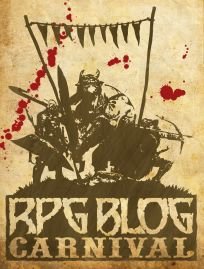This post is part of October's Blog Carnival theme of Horror and Fantasy, hosted Timothy S. Brannan's The Other Side Blog
"Another zombie. Ho hum. I'll kite it, you stick it with arrows."

There is nothing horrific about zombies. Here, look, courtesy of Basic Fantasy RPG:
Zombie (undead)
AC: 7[12] HD: 2 Attack: 2x +1/weapon or swipe(1d8) Mv: 20 ft. No. Appearing: 2d4 (4d6 in the wild) Save: F2 Morale: 12 Treasure Type: none XP: 75
It's basically a slightly worse gnoll that never retreats. This has been a chip on my shoulder for a long time. Here's what I propose:
First, every undead creature should be freaky: they utterly violate the natural order of the world. They should be described with that in mind. Play up the disturbing appearance of their decaying yet animate corpses and their putrefying stench. Mechanically, we might reflect this character reaction in one of two ways:
- Characters need to save vs. fear (the save might be poison, willpower, or wisdom, depending on your system), with failure indicating that the character can't get closer to the undead.
- You might instead use the same mechanics that a cleric's turning uses on undead, exception that player characers will flee in panic instead of being destroyed from a strong result. Treat the zombies as a collective level 2 cleric for the roll. The effect ends when a zombie attacks an affected character.
Second, mechanically, they're just slow meat bags. Lets make the following modifications to the base zombie:
- Make them faster: 30 ft. movement.
- They take only half damage from piercing damage: they have very few critical spots (heart, brains, kidneys, lungs and genitals don't matter), and need to be pummeled or cut up to deadify them.
- Make them not silent when they spot food/life. They're always moaning in hunger when they see a meal.
Third, I have some ideas about mechanically upping the fear factor in a way that will make the players reconsider what they're doing. You should telegraph this change to your players, unless you've established with them that you're doing this with all monsters. Note that I haven't yet used these in a game, but it seems like a good time of the year to do a horror one shot.
- Infectious bite
- Brain eating bite
- Infection by bodily fluids
- Grappling zombies
- Spell resistant
- Co-operative
These zombies are all designed for old school games like Old School Essentials or Basic Fantasy RPG, but should be easily be adapted for any dungeon-crawler tomb-looting type of game from Dungeons and Dragons 5e to Shadowdark to Goblin Laws of Gaming.
Diseased Biting Zombie (undead)
AC: 7[12] HD: 1 Attack: 2x +0/grab(1d4). Special +0/bite (1d2) Mv: 30 ft. No. Appearing: 2d4 (4d6 in the wild) Save: F1 Morale: 12 Treasure Type: none XP: 61
Special: Bite: If the zombie hits with both grab attacks, it makes a free bite someone, they become infected with biter zombie disease unless they save.
Zombie Toughness: Piercing weapons do half damage to zombies.
Zombie Propagation: Humanoids reduced to 0 hp mostly by zombie attacks
or 0 constitution by their disease will become a zombie of the same type
within 1d3 turns.
Zombie Biter disease: Each day, someone infected must make a save, or lose 1d2 constitution. This disease can be cured with cure disease, a turn check just on the infected individual that successfully turns a 3 HD creature, or with a blend of powdered silver (1 sp), a vial of holy water, anise (any kind, a cup full), and shredded mandrake root. In the latter case, the character must save or permanently lose 1d3 constitution. If cured, the character recovers 1 constitution lost to the disease with each day of bed rest, or 1d3-1 constitution per week.
Brain Eating Zombie (undead)
AC: 7[12] HD: 1 Attack: 2x +0/grab(1d4). Special +0/bite (1d2) Mv: 30 ft. No. Appearing: 2d4 (4d6 in the wild) Save: F1 Morale: 12 Treasure Type: none XP: 61 Special: Bite: If the zombie hits with both grab
attacks, it makes a free bite attack. The target loses 1d2 intelligence, on a failed save permanently. Humanoids recover 1 intelligence not permanently lost to the bites with each day of bed rest, or 1d3-1 intelligence per week. Humanoids who die after being bitten re-animate as a brain eating zombie 1d3 turns later.
Zombie Toughness: Piercing weapons do half damage to zombies.
Zombie Propagation: Humanoids reduced to 0 hp mostly by zombie attacks will become a zombie of the same type within 1d3 turns.
Exploding Viscera Zombie (undead)
AC: 7[12] HD: 1 Attack: 2x +0/swipe (1d6) Mv: 30 ft. No. Appearing: 2d4 (4d6 in the wild) Save: F1 Morale: 12 Treasure Type: none XP: 61
Special:Exploding viscera: When a zombie gets to 0 hp due to fire, electrical, or physical damage, it explodes, spraying creatures within 10 ft, doing 1d3 damage. The save is unmodified for those within 5 feet, and with a +4 bonus to those beyond 5 feet. All humanoids must save or become infected, similar to Zombie Biter disease, but turning into exploding viscera zombies.
Zombie Toughness: Piercing weapons do half damage to zombies.
Zombie Propagation: Humanoids reduced to 0 hp mostly by zombie attacks
or 0 constitution by their disease will become a zombie of the same type
within 1d3 turns.
Pile-on Zombie (undead)
AC: 7[12] HD: 2 Attack: 2x +1/weapon or grab(1d4) which ignores armor but not shields, or pile-on (special) Mv: 30 ft. No. Appearing: 2d4 (4d6 in the wild) Save: F2 Morale: 12 Treasure Type: none XP: 75
Special: double-grab: If both grab attacks hit a target, that target must make a strength check to break the hold and be able to move on its action. It takes a -1 penalty for each other pile-on zombie grabbing that target. A zombie that is grabbing a creature at the start of its action tries to push them down and fall on top. The creature must make a strength check to resist falling. Falling creatures must take an action to stand up, but may still move after.
Zombie Toughness: Piercing weapons do half damage to zombies.
Zombie Propagation: Humanoids reduced to 0 hp mostly by zombie attack will become a zombie of the same type
within 1d3 turns.
Spell-Resistant Zombie (undead)
AC: 7[12] HD: 1+2 Attack: 2x +1/weapon or pummel(1d6) Mv: 30 ft. No. Appearing: 2d4 (4d6 in the wild) Save: F1 Morale: 12 Treasure Type: none XP: 61
Special: Spell Resistance: +6 to save vs. spells and, rods, staves, and wands. This does not apply to turn undead in systems that use that as a spell rather than a special ability.
Zombie Toughness: Piercing weapons do half damage to zombies.
Zombie Propagation: Humanoids reduced to 0 hp mostly by zombie attack will become a zombie of the same type
within 1d3 turns.
Hive Zombie (undead)
AC: 7[12] HD: 2 Attack: 2x +1/weapon or pummel(1d6) Mv: 30 ft. No. Appearing: 2d4 (4d6 in the wild) Save: F2 Morale: 12 Treasure Type: none XP: 125
Special: Collective intelligence: Have intelligence 3+number of hive zombies within 40 ft. (up to intelligence 15), with somewhat related ingenuity.
- At 6 intelligence, will pick up and wield weapons.
- At 8 they will talk to their victims, enticing them of the superiority of zombie existence, and co-operate to remove obstacles or do things like climb after prey by giving each other a boost or standing on each other's shoulders.
- At 10, they will examine rooms looking for ropes, levers, and so on, to control their environment, and will avoid fire and other obvious hazards.
- At 12 will manufacture simple traps with simple tools, and use tactics to entrap their victims and avoid subtle hazards like killing fields, trip wires.
- At 15 intelligence, can uses scrolls and wands.
Zombie Toughness: Piercing weapons do half damage to zombies.
Zombie Propagation: Humanoids reduced to 0 hp mostly by zombie attack will become a zombie of the same type
within 1d3 turns.
If you really want to keep your players on their toes, you can mix two types of zombies up in a group--don't combine them, into one gestalt zombie type, though, unless you're going to make worth more experience.
Resist the temptation to make them tougher. They're already stronger than baseline humans, and killing them rapidly should be a viable option.
There's one more variant that should be relatively unique:
Zombie Lord (undead boss)
AC: 7[12] HD: 4+2 Attack: 2x +1/weapon or pummel(1d8) Mv: 30 ft. No. Appearing: 1, with other zombies Save: F4 Morale: 12 Treasure Type: none XP: 360
Special: Spell Resistance: +6 to save vs. spells and, rods, staves, and wands. This does not apply to turn undead in systems that use that as a spell rather than a special ability.
Zombie Lord: Other zombies within 30 ft. get +4 to all saves. Zombies within 300 ft. which have remained undamaged for an hour have all damage removed.
Zombie Toughness: Piercing weapons do half damage to zombies.
Zombie Propagation: Humanoids reduced to 0 hp mostly by zombie attack will become a zombie of the same type
as a lesser nearby zombie within 1d3 turns.
Let me know in the comments below what you do to make zombies at your table more horrifying, mechanically or descriptively, or share any other ideas you have on the topic.

I'm so gonna include these versions on my next zombie encounter!
ReplyDelete